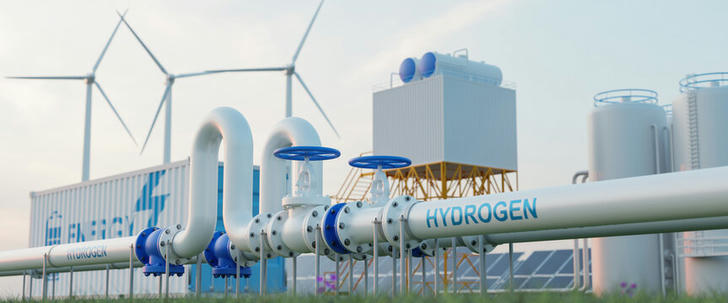Hydrogen: The Next Golden Opportunity in Clean Energy Investment
The global push toward clean energy has gained significant momentum in recent years, with hydrogen emerging as one of the most promising solutions. For U.S. investors, this transition represents not only a shift toward a sustainable future but also a golden opportunity to capitalize on a rapidly growing sector. With government support, technological advancements, and increasing global demand, hydrogen is positioned to be a cornerstone of the clean energy revolution. Here's why savvy investors should pay close attention.

Why Now? Key Drivers of Hydrogen Investment
Several factors are converging to make hydrogen an attractive investment in 2024 and beyond:
Government Incentives and Support
Both federal and state governments in the U.S. are recognizing hydrogen’s potential and providing incentives to accelerate its development. The Biden administration’s Infrastructure Investment and Jobs Act includes significant funding for clean hydrogen projects, and the Inflation Reduction Act offers tax credits for hydrogen production. These policies are aimed at reducing costs and building a robust hydrogen economy.
Technological Breakthroughs
Advancements in electrolysis technology, which produces hydrogen by splitting water molecules using electricity, are reducing the costs associated with hydrogen production. Green hydrogen, produced using renewable energy, is becoming more commercially viable, offering a sustainable and scalable solution for the future.
Global Demand Surge
Countries around the world, especially in Europe and Asia, are increasing their investments in hydrogen infrastructure. As more industries adopt hydrogen as a cleaner alternative to fossil fuels, the demand is set to skyrocket. This presents opportunities for U.S. companies involved in the hydrogen value chain to expand internationally and tap into a growing market.
Energy Security and Diversification
Hydrogen offers the U.S. a chance to reduce its dependence on foreign oil and improve energy security. By producing hydrogen domestically, the U.S. can create a more resilient energy system, less susceptible to geopolitical tensions or supply chain disruptions that have historically impacted oil and gas.
Investment Opportunities in Hydrogen
Investors have several avenues to explore when considering hydrogen investments, each with distinct advantages:
Hydrogen Production Companies
Companies involved in the production of green hydrogen, such as Plug Power, Bloom Energy, and Ballard Power Systems, are at the forefront of the hydrogen revolution. These firms are working to scale up production capabilities, and their stock performance is closely tied to the growing adoption of hydrogen technologies.
Hydrogen Infrastructure and Storage
Hydrogen requires specialized infrastructure for transportation and storage, presenting opportunities for companies that design and build these systems. As hydrogen networks expand, firms like Air Products and Chemicals and Linde are set to benefit from the development of pipelines, storage facilities, and fueling stations.
Fuel Cell Manufacturers
Hydrogen fuel cells are being adopted in various industries, including transportation and heavy equipment. Companies that manufacture hydrogen fuel cells, like FuelCell Energy, stand to benefit from increasing demand for zero-emission vehicles, including trucks, buses, and even ships.
Exchange-Traded Funds (ETFs)
For those seeking a diversified approach, hydrogen-focused ETFs, such as the Global X Hydrogen ETF or the Hydrogen Economy ETF, offer exposure to a basket of companies involved in different aspects of the hydrogen ecosystem. This provides a balanced risk profile while capturing growth across the sector.
Risks to Consider
While the future of hydrogen looks promising, investors should be aware of the potential risks:
High Initial Costs
Hydrogen production, particularly green hydrogen, remains costly compared to traditional fossil fuels. While government subsidies and technological advancements are helping to lower costs, significant investment is still required to scale the infrastructure.
Regulatory Uncertainty
Hydrogen’s growth is highly dependent on supportive government policies. Any changes in regulatory frameworks or the reduction of subsidies could slow the pace of hydrogen adoption and impact the profitability of hydrogen-related companies.
Market Volatility
As with any emerging technology, companies involved in hydrogen may experience volatility as the market evolves. Investors should be prepared for fluctuations in stock prices as the industry matures and new players enter the market.
The Future of Hydrogen: A Long-Term Play
Hydrogen’s role in the global energy mix is only beginning to take shape, but its potential is vast. For U.S. investors, the hydrogen sector offers a chance to participate in the transition to a cleaner, more sustainable economy while potentially reaping significant financial rewards. As hydrogen technologies continue to develop and scale, early investors stand to benefit from what could be one of the most transformative energy sources of the 21st century.
In conclusion, hydrogen presents an exciting opportunity for U.S. investors looking to align their portfolios with the future of clean energy. With strong government support, increasing global demand, and technological innovation driving the industry forward, hydrogen could very well be the next golden opportunity in energy investment.
By understanding the trends and opportunities in hydrogen, investors can position themselves at the forefront of a rapidly evolving market—one that promises both environmental and financial returns. Now is the time to explore the potential of hydrogen and consider its place in a forward-thinking investment strategy.
